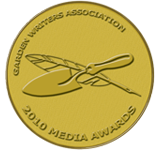The Benefits of Epsom Salt in the Garden: Fact or Folklore?
July 1, 2021 by Robin Plaskoff Horton
 Alexei, PxHere.
Alexei, PxHere.
There’s a lot of anecdotal evidence suggesting that Epsom salt provides numerous benefits in the garden. Is this fact or folklore?
Epsom salt has long been touted as an inexpensive, sustainable and multifunctional soil additive offering a myriad of benefits in the garden. An internet search will turn up loads of articles supporting this claim. But before you jump on the bandwagon and add it to your soil, let’s examine the facts.
 Kevin Dooley, Wikimedia Commons.
Kevin Dooley, Wikimedia Commons.
What is Epsom salt?
Epsom salt is a crystallized form of magnesium sulfate, a common household item often prescribed for relaxing sore muscles and relieving pain. The Epsom Salt Council markets it as a safe, natural soil additive that prevents insects, blight and other plant problems while also providing vital nutrients to optimize plant growth. The salts may be great for aches and pains, but whether the substance reduces headaches in the garden seems to be more folklore than fact. Epsom salt contains magnesium and sulfur, nutrients plants need to thrive, but not in abundance, and apart from sandy and acidic soils, most soils are not deficient in magnesium or sulfur.
How Do I Know If My Soil Needs Magnesium?
According to Canadian Master Gardener and publisher of Garden Myths, Robert Pavlis, it’s not so easy to identify a nutrient deficiency just by looking at the plant. If a plant’s lower leaves turn yellow between the veins, it may signal the soil is lacking magnesium. If the leaves turn yellow all over, it could mean the soil is deficient in sulfate. What’s more, too much potassium can inhibit the plant roots from absorbing magnesium and cause leaves to yellow. Many other factors that cause leaf yellowing can be mistaken for magnesium deficiency—including insect damage, other nutrient deficiencies, diseases, and compacted soil.
 Daniel Hajdacki, Unsplash.
Daniel Hajdacki, Unsplash.
Can Epsom Salt Benefit Plants?
Apart from anecdotal evidence, no research demonstrates that Epson salt is a cure-all in the garden. Experts say these claims are more myths than facts. Soils deficient in magnesium will benefit from adding Epsom salt, but the only way to determine this is to conduct a soil test.
Linda Chalker-Scott, PhD, Professor and Urban Horticulturist at Washington State University, poses the question: “How does plain old magnesium sulfate do all of these miraculous things? The short answer is–it doesn’t. There’s not one speck of science behind any of this nonsense.”
 Greg Rosenke, Unsplash.
Greg Rosenke, Unsplash.
The Claims About Benefits of Epsom Salt in the Garden
According to Washington State University horticulturists, these are among the many unsubstantiated claims for Epsom salt’s benefits in the garden:
• Helps seeds germinate.
Non-dormant seeds only need water and oxygen to germinate. Magnesium sulfate will not increase germination time or success.
• Makes plants grow bushier, produces more flowers, and increases chlorophyll production.
No scientific evidence shows that treated plants have more leaves, flowers, or chlorophyll than those grown under normal conditions. Chlorophyll production depends on light availability, and excess levels of magnesium will not affect this.
• Deters pests, such as slugs and voles.
On the contrary, some research has demonstrated that magnesium-deficient plants tend to be more resistant to pests than those with sufficient magnesium.
• Cures Or Prevents Blossom End Rot.
Epsom salt is often recommended to prevent blossom end rot in tomato plants. Not only will it not prevent or cure blossom end rot —it may encourage it.
• Prevents or Kills Weeds.
Yes and no. The combination of Epsom salt, vinegar and soap is one common home remedy for controlling weeds, however, Jeff Gillman Ph.D, Director of the Botanical Gardens at the University of North Carolina, Charlotte, does not recommend its use.
Gillman conducted trials on the purported weed-killing cocktail and concluded that it does indeed burn the weeds, but as it doesn’t kill the roots, they will return like that unwelcome house guest. And the folk remedy may cause other problems too. “Adding Epsom salts to an herbicide is a mistake because, over time, repeated applications of this herbicide will increase the amount of salt in the soil (Epsom salt is, after all, a type of salt) and could damage other plants in the area.” Instead, Gillman recommends the safest, easiest and most effective weed-killing remedy available: pull or dig the weeds out.
 Stella de Smit, Unsplash.
Stella de Smit, Unsplash.
Shouldn’t I Try Epsom Salt In the Garden Because It’s Harmless?
Some say what the heck, whether it works or not, it’s safe because it’s impossible to overuse Epsom salt. Experts disagree with this assertion, warning that too much magnesium can be harmful to plants. It can interfere with the uptake of other nutrients, promote soil toxicity, cause long-term potassium deficiency, scorch leaves if sprayed directly them, and if used in excess may even kill the plant. In addition, highly soluble Epsom salt will leach out of the soil and into the water table and raise magnesium levels elsewhere.
 Lesla T, PxHere.
Lesla T, PxHere.
Research In One’s Own Garden
Despite the lack of scientific research demonstrating any Epson salt benefits, at least one reputable gardener is a fan of its use. Chris VanCleave, aka The Redneck Rosarian and past President of the Birmingham chapter of the American Rose Society, uses it in his rose garden at the beginning of the season after the roses begin to leaf out. VanCleave, who thinks the best research is done in one’s garden, conducted his own test by applying Epsom salt to some shrubs and not others and concluded it improved overall plant health, vigor and bloom production.
Although he generally tests his soil every other year to ensure he’s within a good range, VanCleave doesn’t specifically test before applying Epsom salt. His testing occasionally shows lower than expected levels of magnesium, which he believes is due to nutrients leaching out over time. VanCleave’s method for applying Epsom salt is simple: every Spring, he applies 1/2 cup in a circle around the base of the shrub, then waters it.
Bottom Line: Test Your Soil Before You Add Anything
Experts say that if using Epson salt in the garden, you might be creating a problem while attempting to solve one that doesn’t exist. Your best bet is to test the soil to determine what may be lacking before adjusting or adding any nutrients. Reach out to your local extension service for a soil test kit and for assistance in interpreting the results.


 e-mail a friend
e-mail a friend


















The Benefits of Epsom Salt in the Garden: Fact or Folklore? – Urban Gardens | TripWriters Pingback said:
[…] By Urban Gardens July 1, 2021 0 1 Facebook Twitter Pinterest WhatsApp [ READ THE ORIGINAL ARTICLE ] […]
— July 2, 2021 @ 06:05
Buy Tarpaulins supply medium weight tarpaulins
— October 7, 2021 @ 06:26
Interesting topic. I’ve been more curious about this kind of plant. Thank you for this.
— January 20, 2022 @ 23:19
Trying to build my own flower garden at home. This is really helpful.
— January 26, 2022 @ 19:37
Nice and Good Writing
— February 1, 2022 @ 05:28
Keep up the great work, I look forward to reading more.
— March 3, 2025 @ 11:12
I enjoy reading your blog. The author consistently provide valuable information. Thank you for posting.
— March 8, 2025 @ 08:07
Your content is enriching, I’ve learnt so much from it.
— March 15, 2025 @ 19:44
Your enthusiasm is infectious. It’s hard not to get excited about the things you write about.
— March 16, 2025 @ 08:58